
The Top Local SEO Services to Drive Results
Conducting a results-driven local SEO campaign can be a time-consuming process due to the sheer volume of tasks that need to be completed. A highly effective strategy can easily involve a dozen or so different tactics. Most will need to be carried out consistently and to best-practice standards, which means you’ll also need to factor in the time required to learn about local SEO and stay on top of algorithm updates.
If you have multiple local business locations and need to carry out local SEO for each one, it’s an even more daunting prospect.
Why should I opt for local SEO services?
The level of commitment required to conduct an effective local SEO campaign isn’t realistic for many local businesses.
Just as you might opt to outsource the dry cleaning of staff uniforms, or retain a landscaping service to keep your property looking presentable instead of tending to shrubbery firsthand, it’s common to appoint a local SEO agency or consultant to handle your local search engine marketing.
Outsourcing not only saves you time but also offers peace of mind that an expert is handling activities that can make or break your local search presence.
To ensure you choose the correct partner and have the necessary local search engine optimization tactics taken care of, it’s helpful to understand what a local SEO specialist does, and how they can help. While there may be some elements that you are happy to handle in-house, there are other services where delegating to a professional pair of hands is a more attractive prospect.
What does a local SEO specialist do?
A local SEO specialist helps local businesses to improve their presence in the local search results. They will carry out a range of activities including optimization of the local business website, reputation management, and Google Business profile optimization.
What are local SEO services?
The top local SEO services that you might be considering outsourcing to an agency partner or consultant include:
- Website localization
- Local content creation
- Local link building
- Google Business Profile setup and optimization
- Google Business Profile Posts management
- Google Business spam fighting
- Building local citations
- Managing local citations
- Reputation management
- Monitoring local search rankings
- Local search audit
- Keyword research
1. Localizing Your Website
Localizing your website is the process of incorporating the name of your city, county, state, or region naturally throughout your site content, including the footer and contact page, as well as in key parts of your website’s metadata (such as page titles, H1 headers, and meta descriptions).
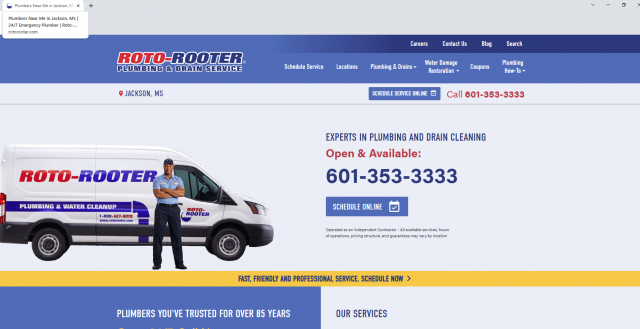
This process tells search engines a lot about which local search results your website should appear in. This is important as it helps to establish the relevance of your website for local search results.
Multi-business locations shouldn’t localize the main site for a specific location. Instead, individual location pages (or store pages) should be created. These pages are then localized for their own surrounding area. Each location page should also use the location keyword in its URL structure.

2. Local Content Creation
To further develop your site’s localization standing and improve on-page optimization, creating useful, relevant, and locally focused content on a regular basis is a must. Good quality content can also attract inbound links, which further boosts online visibility and business prominence.
One way to do this is to create content hubs to sit around your location pages. This means creating content related to the local area, such as listing upcoming local events, collating a director of local businesses, and sharing local news and views.
If you run an estate agency, for example, you could create a ‘moving guide’ content hub for your local area to help any clients planning a move. Here you could share a range of helpful content such as a list of local medical centers, the best local restaurants, how to navigate public transport, the top 5 gyms, a guide to flexible office spaces, and local holiday events.
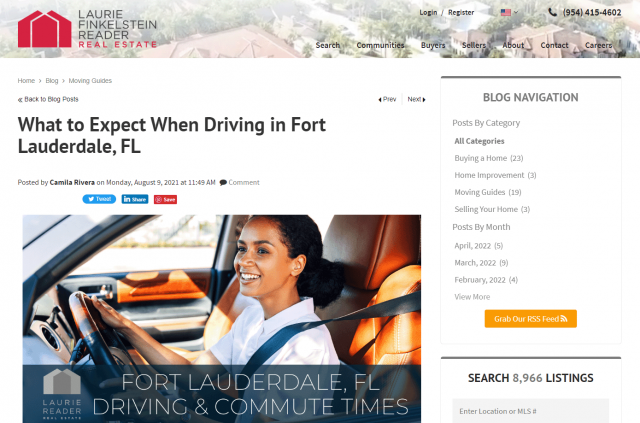
3. Local Link Building
Obtaining local links is an important part of local SEO. A longstanding local SEO ranking factor, links also help your site to be more visible online and provide new discovery routes for local consumers.
Link building for a local business will often involve outreach, engagement, and participation with the local community. Local links can come from a wide range of sources, including local media outlets, local chambers of commerce and business groups, directory sites, community groups, and even other local businesses.
Related: How to Master Local Link Building – Free Online Course
Identifying potential sites to get a local link and reaching out to prospects is time-consuming. However, a good local SEO agency or consultant should have a range of local link building tactics up their sleeve, whether that be by creating useful content, sponsoring an event, contributing to the community, or helping out with a local charity.
Link building also ups the prominence of your business and can add credibility and authority to your brand.

4. Google Business Profile Setup and Optimization
Google Business Profile information is used to populate local search results, the Local Pack, and Maps so claiming your business listing and keeping it fully optimized is a core aspect of any local SEO strategy. Google Business Profile signals feature heavily in the top 15 most influential local SEO ranking signals, with importance also increasing year on year.
Profile setup is also key to the wider success of your local business, with Google data confirming that:
- Local consumers are 2.7% more likely to view your business as reputable if the Google Business Profile is complete
- 50% more likely to make a purchase and
- 70% more likely to visit your location.
Many of the features built into the Google Business Profile (including Q&As, Google Posts, and Google Reviews) provide the local search user with useful information before they even consider visiting your website.
This information is visible directly from the local search results page so can influence a search user’s opinion of the business and inform what they know about products and services even if they don’t click through to visit the local business website.
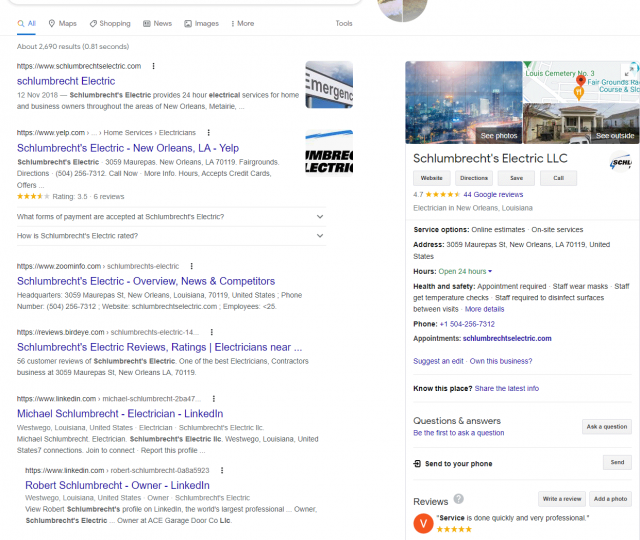
5. Google Business Profile Posts Management
Google Business Posts are the local search version of social media updates. These short updates offer a way to share news, events, offers, and company announcements with local consumers.
Using Posts means:
- Local search users have more information about your business
- They can easily access product announcements and special offers directly from local search
- You can engage local consumers with timely information and locally themed content
- You can promote your special offers, sales, and discounts within the local search results
- Offer a better customer experience with easy access to the most up-to-date information about your business
- Share engaging images and videos to capture the search user’s attention
You can see how Posts appear in the local SERP below. There they are in the bottom right:
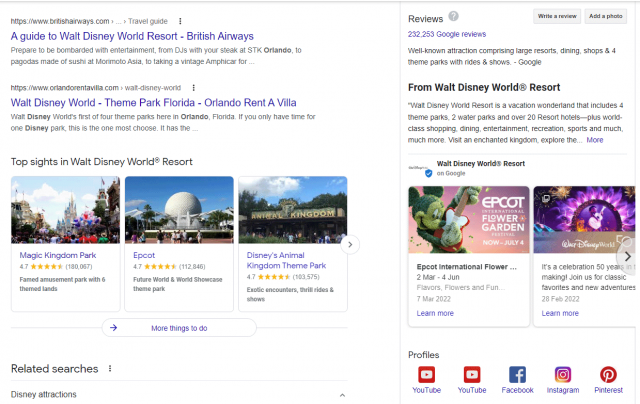
And here’s the detail you get when you click on one:
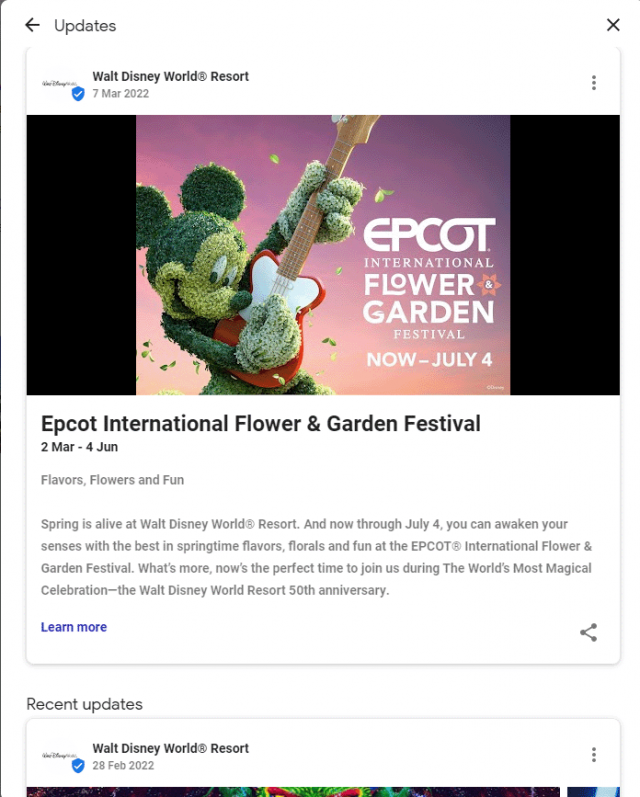
Creating posts at scale can be incredibly time-consuming and tricky. This is where a local SEO service like GBP Post Scheduler can change the game.
6. Google Business Profile and Maps Spam Fighting
Google Business Profile spam poses an active threat to your search visibility. Fake profiles could see your business pushed down the local search results by actively competing with your own listing. Fake reviews, meanwhile, could give local consumers a false negative review of your business.
Spam is prevalent on Google Business. Google says that in the 2021 alone, it stopped over three million attempts to fraudulently claim Business Profiles, removed over three million fake Business Profiles, and removed more than 55 million reviews.
It can be tricky for the average consumer to spot a fake or spam profile and, while monitoring for spam can be tedious, it’s vital to protect your local search presence and reputation.
By flagging up fake reviews and reporting Spam Profiles, you aren’t wasting time and resources fighting against non-existent businesses or competitors trying to spam their way to the top of the listings using black hat techniques. Fake profiles may need to be flagged multiple times before being removed by Google.
Misleading or spam profiles on Google Maps can be reported using the Redressal Form or via ‘Suggest an edit’ on the profile itself.
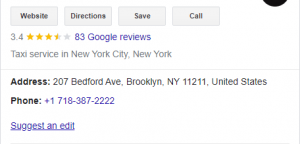
7. Building Local Citations
A local citation is a mention of your business data online, often your name, address, and phone number (NAP). Citations can be built from a range of sources, including business directories, online review sites, social media profiles, and event listings.
Anywhere that your business’s NAP appears online is considered a citation and can give your local SEO a boost.
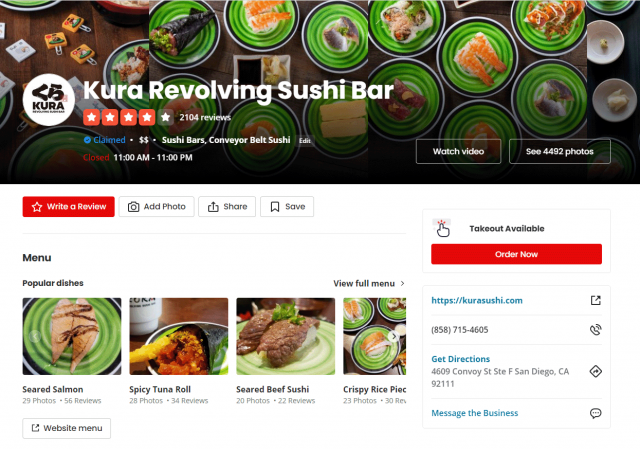
There are hundreds, if not thousands, of local citation sites out there, some focusing on particular areas or industries. Therefore, it’s important for whoever is doing your citation building, whether it’s a local citation building service or just you, has a great understanding of your business, your location, and your industry in order to get you on the key ones first.
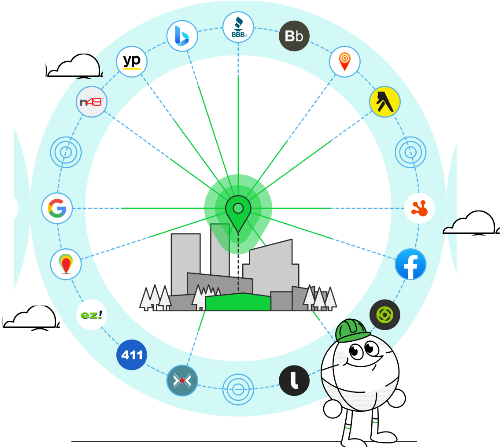
Get Citations Done Fast... and Own Your Listings Forever
No recurring fees. Complete Control. Super-low cost.
8. Managing Local Citations
Building citations is just one aspect of this local SEO tactic. In addition to adding new citations, you should audit existing citations and then manage your citations to ensure the data is accurate and updated when necessary. When reviewing what local SEO services are on offer by an agency or consultant, look out for citation cleanup and management as an ongoing service, too.
Multi-location businesses face a further complication in that data managing many citations, across many locations can become hugely unwieldy very quickly.
9. Reputation Management
Online reviews are more important than ever with local consumers reading more reviews, more often. When it comes to trust, they help consumers to build shortlists, compare local businesses and ultimately decide where to spend their money.
Reputation management includes:
- Being proactive about requesting reviews to build your review profile
- Monitoring for new reviews
- Responding to good reviews
- Responding to negative reviews
- Identifying any recurring issues flagged up in reviews that could impact the wider success of the business (such as complaints about venue cleanliness, long wait times, or unhelpful staff)
- Repurposing good reviews
- Identifying appropriate new review platforms
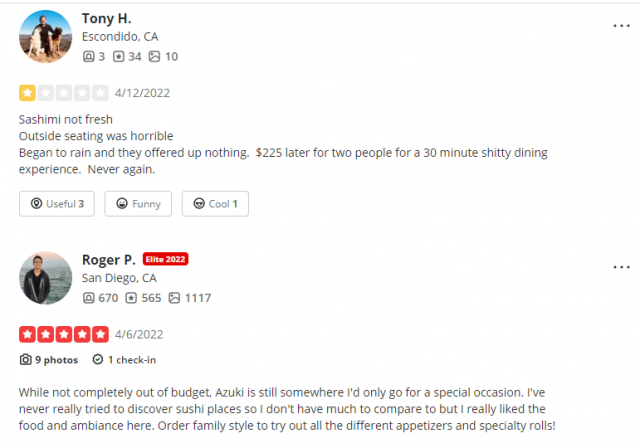
For enterprise businesses with hundreds of locations, online reputation is so crucial they often have a staff member or team entirely dedicated to monitoring, managing, and prioritizing the hundreds of thousands of reviews they receive every day. The online review statistics speak for themselves and further highlight their importance. This is where a reputation management tool can really help.
Build a 5-star Reputation
Collect, monitor, and respond to reviews with ease
10. Monitoring Local Search Rankings
Your local search rankings are the culmination of all of the effort put into your local SEO strategy. Without a local search ranking tracker system in place, it’s impossible to know if your strategy is delivering results. A failure to monitor rankings also means that you could easily be in the dark about a sudden drop in rankings which may be caused by a new algorithm or Google penalty being applied.
It’s not enough to perform a local search every now and again. Any local business serious about enhancing its local search presence needs to be vigilant about monitoring keyword performance and competitor rankings continually. The way that rankings are checked should also replicate how local consumers are searching for your business, using specific search locations.
Put Your Rankings on the Map. Literally. Track and improve rankings with BrightLocal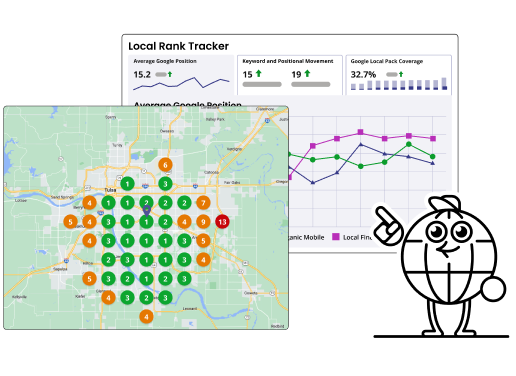
11. Local Search Audit
When reviewing what the local SEO services your shortlisted agency or consultant offers are, a local search audit should be one of the things on your radar.
A local search audit is a comprehensive analysis of your website’s local search performance.
A solid local search audit should:
- Audit your local search rankings
- Provide an overview of your citations
- Review your reputation management strategy
- Audit your inbound links and explore link building opportunities
- Audit your Google Business Profile(s)
- Audit your on page performance
- Perform local keyword research
- Give you insights into your competitors
Without your local SEO services provider giving you the lowdown on your current situation and the industry landscape, you won’t be able to tell how much value you’re getting out of them once appointed.
An audit also acts as a health check and form of due diligence, identifying areas of concern and highlighting opportunities to do better so that you can feel confident that you’re dedicating resources to the right areas and maximizing every opportunity to grow your local search visibility above your competitors.
Run a Local SEO Audit in Minutes
Analyze 300+ key data points in one go
12. Keyword Research
Conducting thorough local keyword research and keeping on top of emerging keywords as search behaviors change informs many areas of your local SEO strategy, from the wording on your Google Profile to the text used on your website.
Keyword research can be a complex process, with myriad keyword combinations to consider and metrics such as competition level and intent to keep in mind. Researching keywords should also be done in a manner that replicates how long consumers search, so an understanding of changing behaviors and emerging trends is also useful.
Because keywords are intrinsic to every aspect of your local SEO strategy, keyword research will need to be approached as an ongoing task, otherwise, you run the risk of your SEO tactics being based on outdated data that won’t generate the search traffic and conversions you expect.